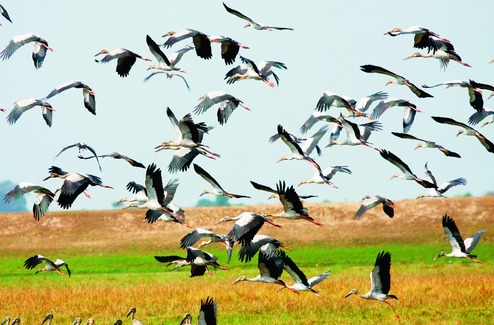
Migratory birds at the Chilika Lake. Picture by Ashwinee Pati
Bhubaneswar, Sept. 3: Chilika, Asia's largest brackish water lake, will shortly be ready to play host to migratory birds from various parts of Asia and Eastern Europe with focus on keeping poachers at bay.
'Birds will start arriving in the lake from October and we will be setting up camps for their protection at various places in the lake area,' said Chilika divisional forest officer Bikash Ranjan Das. Pointing out that around 19 bird protection camps were set up in Chilika last year, the officer indicated that similar steps would be taken this time as well.
Since Chilika is one of the largest wintering grounds of migratory birds in Asia, forest officials remain on their toes in the lake area for five to six months from October to prevent killing of the avian guests. However, incidents of poaching take place every year despite such efforts.
Last November, forest officials had caught four poachers from various parts of the lake. While two of these were nabbed from Balipatapur area with 10 dead birds and a motorcycle, another two were arrested by the anti-poaching squad with an unspecified number of birds and a net used for trapping the winged guests coming to the lake.
Das described Tangi in Khurda district as one of the most vulnerable areas as far as bird poaching in Chilika, a lake spread over three districts of the state, is concerned. Sorana and Mangaljodi on the banks of the lake are also sensitive areas from poaching point of view.
During the last census in January, more than nine lakh birds belonging to 176 species were counted in the lake.
In 2016, as many as 8.58 lakh birds of 161 species had visited the lake. But the lake continues to be plagued by problems such as rampant prawn culture and high silt load. Prawn enclosures, locally known as gherries, dot the lake despite periodical anti-encroachment drives undertaken by the administration.
'The problem of illegal prawn culture in the lake would continue unless the government launches a sustained drive against it. Periodical drives won't help as the gherries invariably reappear,' said a local fisherman.










